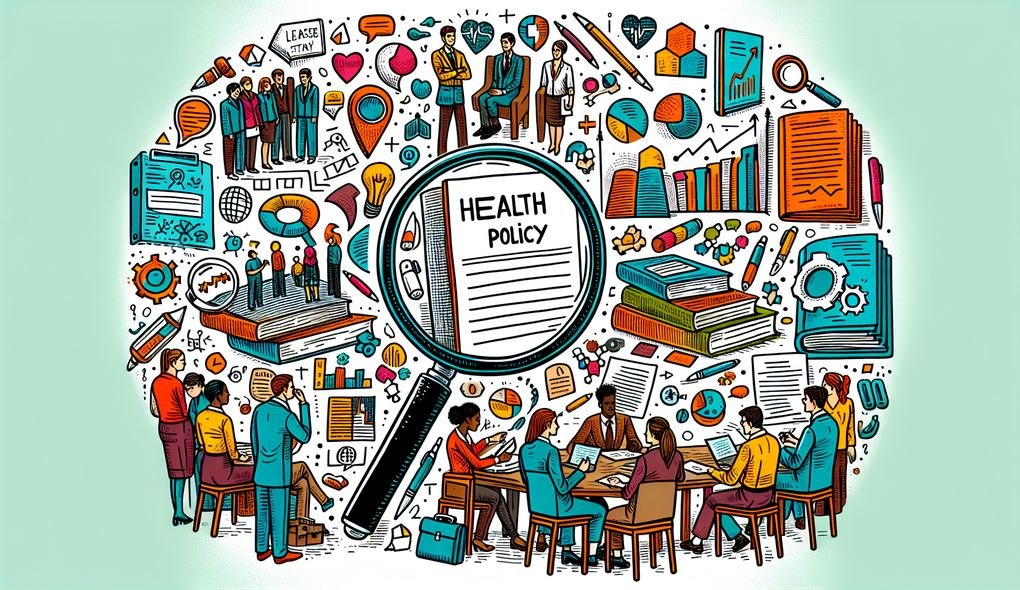How do you typically go about developing policy briefs and reports?
INTERMEDIATE LEVEL

Sample answer to the question:
When developing policy briefs and reports, I typically start by conducting thorough research on current healthcare policies and proposed legislation. This involves gathering relevant data and information from a variety of sources, such as research studies, government reports, and healthcare databases. After analyzing the data, I identify key trends, disparities, and areas for improvement. I then use this information to develop clear and concise policy briefs and reports, summarizing the research findings and providing evidence-based recommendations for policy development and reform. Throughout this process, I collaborate with stakeholders from various backgrounds to ensure that the potential impact of policy changes is carefully assessed. Finally, I communicate the complex policy information in a way that is accessible and understandable to different audiences.
Here is a more solid answer:
When developing policy briefs and reports, I rely on my strong analytical and critical thinking skills to thoroughly research current healthcare policies and proposed legislation. I gather relevant data and information from various sources, such as research studies, government reports, and healthcare databases, using data analysis software like SPSS and STATA to analyze the data. This allows me to identify key trends, disparities, and areas for improvement. I then leverage my excellent written and verbal communication skills to develop clear and concise policy briefs and reports, summarizing the research findings and providing evidence-based recommendations for policy development and reform. Throughout this process, I work both independently and in a team environment, collaborating with stakeholders from diverse backgrounds to ensure a comprehensive assessment of the potential impact of policy changes. My strong organizational and project management skills help me stay on track and meet deadlines, making sure the policy briefs and reports are delivered on time.
Why is this a more solid answer?
The solid answer adds specific details about the candidate's skills, such as their proficiency in data analysis software and their ability to work independently and in a team environment. It also mentions their strong organizational and project management skills, which are important for effectively developing policy briefs and reports. However, it could still be improved by providing more examples of past projects or experiences where the candidate has successfully developed policy briefs and reports.
An example of a exceptional answer:
When developing policy briefs and reports, I follow a comprehensive and strategic approach. Firstly, I conduct a thorough analysis of current healthcare policies and proposed legislation, leveraging my strong analytical and critical thinking skills. I collect and analyze data from various sources, applying advanced statistical analysis software like R to identify trends, disparities, and areas for improvement. Secondly, I synthesize the research findings into clear and concise policy briefs and reports, utilizing my excellent written and verbal communication skills to effectively communicate complex policy information. I provide evidence-based recommendations for policy development and reform, drawing on my in-depth understanding of healthcare systems and legislative processes. Furthermore, I actively collaborate with stakeholders, including policymakers, healthcare providers, and the public, to ensure their perspectives are considered in the policy development process. Lastly, I demonstrate strong organizational and project management skills, effectively managing timelines and deadlines to deliver high-quality policy briefs and reports. Overall, my comprehensive approach, combined with my expertise in data analysis, communication, and stakeholder engagement, allows me to develop impactful policy briefs and reports that drive positive change in healthcare systems.
Why is this an exceptional answer?
The exceptional answer demonstrates a deep understanding of the candidate's role as a health policy analyst and their ability to approach policy briefs and reports comprehensively. It highlights their proficiency in advanced statistical analysis software like R and their in-depth understanding of healthcare systems and legislative processes. Additionally, it emphasizes their collaborative nature and strong organizational and project management skills. The candidate's comprehensive approach and expertise in data analysis, communication, and stakeholder engagement contribute to their ability to develop impactful policy briefs and reports.
How to prepare for this question:
- 1. Familiarize yourself with the current healthcare policies and proposed legislation in your area of expertise.
- 2. Develop your skills in data analysis software, such as SPSS, STATA, or R, to effectively analyze healthcare data.
- 3. Practice synthesizing complex information into clear and concise policy briefs and reports.
- 4. Improve your written and verbal communication skills to effectively convey complex policy information to different audiences.
- 5. Enhance your collaborative skills by seeking opportunities to work with stakeholders from diverse backgrounds.
- 6. Hone your organizational and project management skills to effectively manage timelines and deadlines.
- 7. Stay updated on changes in the healthcare landscape, including legal, regulatory, and technological developments.
What are interviewers evaluating with this question?
- Analytical and critical thinking skills
- Excellent written and verbal communication skills
- Proficiency in data analysis software
- Ability to work independently and in a team environment
- Strong organizational and project management skills

